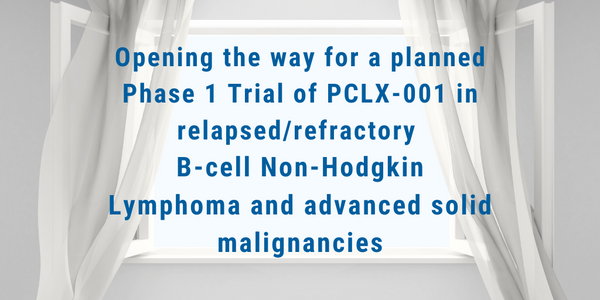Edmonton, Alberta, Canada, March 11, 2021.
Pacylex Pharmaceuticals, an oncology company unlocking a new approach to cancer therapy, announced the receipt of a No Objection Letter from Health Canada on March 8, 2021, opening the way for a planned Phase 1 Trial of PCLX-001 in relapsed/refractory B-cell Non-Hodgkin Lymphoma and advanced solid malignancies. Pacylex is developing this NMT inhibitor, PCLX-001, as a first in class therapy for various cancers. PCLX-001 is believed to be the first NMT inhibitor that will be clinically tested.
Three principal investigators will oversee the clinical study at three clinical sites in Canada: Dr. John Kuruvilla at Princess Margaret Cancer Centre in Toronto, Dr. Randeep Sangha at the Cross Cancer Institute in Edmonton and Dr. Laurie Sehn at the British Columbia Cancer Center in Vancouver.
“Health Canada approval to conduct this trial is an exciting step in bringing PCLX-001 into the clinic. As a first-in-class agent with a new mechanism of action, we plan to see how well people with lymphoma and other cancers tolerate the drug and hope to see some of them benefit,” said Dr. Sangha, MD FRCPC, Director, Clinical Trials Unit, Cross Cancer Institute.
Dr. Kuruvilla added "We are excited to be working with other Canadian research teams and Pacylex to study a novel therapy with a unique mechanism of action in patients with lymphoma". Dr. Kuruvilla is Clinician Investigator in the Cancer Clinical Research Unit (CCRU), Princess Margaret Cancer Centre.
Clinical site preparations are underway for the open label, dose escalation, Phase 1 clinical trial, principally to evaluate the safety of PCLX-001. The study will enroll 20-30 patients and the Company anticipates that enrollment will begin in the second quarter of 2021.
Pacylex received a milestone-based Alberta Innovates AICE grant in 2020 to help fund this study, and the No Objection Letter triggered the first milestone payment from this grant. The Alberta Cancer Foundation and the Cure Cancer Foundation both provided support for this research.
PCLX-001
PCLX-001 is a small molecule, first-in-class N-myristoyltransferase (NMT) inhibitor, originally developed by the University of Dundee Drug Discovery Unit as part of a program to treat African sleeping sickness funded by Wellcome Trust. Pacylex is developing PCLX-001, which has excellent oral bioavailabilty, to treat leukemia and lymphoma. PCLX-001 selectively kills cancer cells and completely regresses (eliminates) tumors in animal models of acute myeloid leukemia (AML), diffuse large B-cell lymphoma (DLBCL) and Burkitt’s lymphoma (BL). PCLX-001 has also been shown to inhibit the growth of lung and breast cancer tumors in animal models. In leukemia, lymphoma and breast cancer patients, the level of NMT2 is correlated with survival, suggesting an important biological role in these cancers. In tests using cultured cancer cells in vitro, PCLX-001 is at least ten times as potent as Ibrutinib (Imbruvica) and Dasatinib (Sprycel), two clinically approved drugs currently used to treat hematologic malignancies.
For more information:
Michael J. Weickert
CEO, Pacylex Pharmaceuticals, Inc.
E: Michael.weickert@pacylex.com
P: 650-218-1840
Twitter @Pacylex (https://twitter.com/pacylex)
LinkedIn (www.linkedin.com/company/pacylex-pharma)
Facebook (https://www.facebook.com/pacylex)
#cancer, #lymphoma, #leukemia, #albertacancer, #Pacylex, #PCLX001, #UAlberta; #UAlberta_FoMD; #Worldslongestgame; #CRINA
About Pacylex
Pacylex is a pharmaceutical company targeting hematologic cancers with a new first-in-class therapeutic, and is headquartered in Edmonton, Alberta, Canada. Pacylex’s technology combines new insights from Dr. Luc Berthiaume of the University of Alberta, connecting myristoylation to cancer, with a family of high quality myristoylation inhibitors Pacylex licensed from the University of Dundee. PCLX-001 is the lead drug in a new class of NMT inhibitors, enabling Pacylex to exploit NMTs as new clinical targets for cancer treatment. Pacylex expects to begin clinical studies in Canada in the spring of 2021 in diffuse large B-cell lymphoma and solid tumors.









